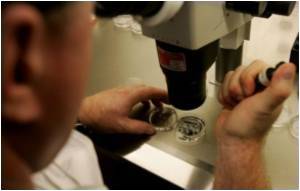New research by King's College London suggests that eczema caused by defects in the skin could reduce the risk of developing skin cancer.

There is ongoing debate surrounding allergic diseases and their impact on the likelihood of developing cancer, with some studies suggesting that eczema is associated with a reduced risk of skin cancer. However, it is difficult to draw firm conclusions based on studies of human populations because eczema symptoms vary in severity and drugs used to treat the condition might also influence cancer. Published today in eLife, the study by researchers at King's College London is the first to show that allergy caused by the skin defects could actually protect against skin cancer.
Skin cancer is a common and growing problem, accounting for one in every three cancers diagnosed worldwide, according to the World Health Organization. Recent findings suggest that malignant melanoma, the most dangerous form of skin cancer, is now five times more common in the UK than it was in the 1970s.
Eczema can result from the loss of structural proteins in the outermost layers of the skin, leading to a defective skin barrier. Genetically engineered mice lacking three skin barrier proteins ('knock-out' mice) were used in the King's study to replicate some of the skin defects found in eczema sufferers.
The researchers, funded by the Medical Research Council (MRC), the Wellcome Trust and Cancer Research UK, compared the effects of two cancer-causing chemicals in normal mice and mice with the barrier defect (the knock-out mice). The number of benign tumours per mouse was six times lower in knock-out mice than in normal mice. The findings suggest that defects in the epidermal barrier protected the genetically engineered mice against benign tumour formation.
Researchers found that both types of mice were equally susceptible to acquiring cancer-causing mutations. However, an exaggerated inflammatory reaction in knock-out mice led to enhanced shedding of potentially cancerous cells from the skin. This cancer-protective mechanism bears similarities to that which protects skin from environmental assaults such as bacteria.
Advertisement
'I hope our study provides some small consolation to eczema sufferers – that this uncomfortable skin condition may actually be beneficial in some circumstances.'
Source-Eurekalert















